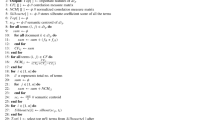Abstract
Due to the rapid growth of the web, the process of collecting the relevant web pages based on the user query is one of the major challenging tasks in recent days. Hence, it is very complicated for the users to know the most relevant information even though various search engines are widely employed. To deal with users’ trouble in identifying the relevant information from the web, we have proposed a meta-lion search engine to capture and analyze the ranking scores of various search engines and thereby, generate the re-ranked score results. Accordingly, LionRank, a lion algorithm-based meta-search engine is proposed for the re-ranking of the web pages. Here, different features like text based, factor based, rank based and classifier based features are used by the underlying search engines. In classifier based feature extraction, we have used the fuzzy integrated extended nearest neighbor (FENN) classifier to include the semantics in feature extraction. Moreover, an intelligent re-ranking process is proposed based on the lion algorithm to fuse the features scores optimally. Finally, the results of the proposed LionRank is analyzed with the web page database collected through four benchmark queries, and the quantitative performance are analyzed using precision, recall, and F-score. From the results, we proved that the proposed LionRank obtained the maximum F-score of 81% as compared with that of existing search engines like QuadRank, Outrank, Google, Yahoo, and Bing.
Similar content being viewed by others
References
Naim I, Ali R. Metasearching using modified rough set based rank aggregation. In: Proceedings of International Conference on Multimedia, Signal Processing and Communication Technologies, Aligarh, 2011. 208–211
Keyhanipour A H, Moshiri B, Piroozmand M, et al. WebFusion: fundamentals and principals of a novel meta search engine. In: Proceedings of International Joint Conference on Neural Networks, Vancouver, 2006. 4126–4131
Sumiya K, Kitayama D, Chandrasiri N P. Inferred information retrieval with user operations on digital maps. IEEE Int Comput, 2014, 18: 70–73
Davison B D. The potential of the meta-search engine. In: Proceedings of the Annual Meeting of the American Society for Information Science and Technology, Providence, 2004. 393–402
Sun Y Z, Han J W. Meta-path-based search and mining in heterogeneous information networks. Tinshhua Sci Technol, 2013, 18: 329–338
Cao Y L, Huang T J, Tian Y H. A ranking SVM based fusion model for cross-media meta-search engine. J Zhejiang Univ Sci C, 2010, 11: 903–910
Keyhanipour A H, Moshiri B, Kazemian M, et al. Aggregation of web search engines based on users’ preferences in WebFusion. Knowl-Based Syst, 2007, 20: 321–328
Desarkar M S, Sarkar S, Mitra P. Preference relations based unsupervised rank aggregation for metasearch. Expert Syst Appl, 2016, 49: 86–98
Ma S X, Li S Y, Yang H J. Creative computing for personalisedmeta-search engine based on semantic web. In: Proceedings of the 21st International Conference on Automation and Computing, Glasgow, 2015
Keyhanipour A H, Moshiri B, Lucas C. User modeling for the result re-ranking in the meta-search engines via the reinforcement learning. In: Proceedings of the 7th International Conference on Intelligent Systems Design and Applications, Rio de Janeiro, 2007
Lange S, Gebert S, Zinner T, et al. Heuristic approaches to the controller placement problem in large scale SDN networks. IEEE Trans Netw Serv Manage, 2015, 12: 4–17
Keyhanipour A H, Moshiri B, Lucas C. User modelling for the result re-ranking in the meta-search engines via the reinforcement learning. In: Proceedings of the 7th International Conference on Intelligent Systems Design and Applications, Rio de Janeiro, 2007
Mavridis T, Symeonidis A L. Identifying valid search engine ranking factors in a Web 2.0 and Web 3.0 context for building efficient SEO mechanisms. Eng Appl Artif Intel, 2015, 41: 75–91
Huang J, Yang X K, Fang X Z, et al. Integrating visual saliency and consistency for re-ranking image search results. IEEE Trans Multimedia, 2011, 13: 653–661
Hassanpour H, Zahmatkesh F. An adaptive meta-search engine considering the user’s field of interest. J King Saud Univ Comput Inf Sci, 2012, 24: 71–81
Vargas-Vera M, Castellanos Y, Lytras M D. CONQUIRO: a cluster-based meta-search engine. Comput Human Behav, 2011, 27: 1303–1309
Rajakumar B R. Lion algorithm for standard and large scale bilinear system identification: a global optimization based on lion’s social behaviour. In: Proceedings of Congress on Evolutionary Computation, Beijing, 2014
Rohini U, Varma V. A novel approach for re-ranking of search results using collaborative filtering. In: Proceedings of the International Conference on Computing: Theory and Applications, Kolkata, 2007. 491–496
Iraji M S, Maghamnia H, Iraji M. Web pages retrieval with adaptive neuro fuzzy system based on content and structure. Modern Educ Comput Sci, 2015, 7: 69–84
Karisani P, Rahgozar M, Oroumchian F. A query term re-weighting approach using document similarity. Inf Process Manage, 2016, 52: 478–489
Akritidis L, Katsaros D, Bozanis P. Effective rank aggregation for metasearching. J Syst Softw, 2011, 84: 130–143
Muller E, Assent I, Steinhausen U, et al. OutRank: ranking outliers in high dimensional data. In: Proceedings of IEEE International Conference on Data Engineering Workshops, Cancun, 2008. 600–603
Xu J, Li H. Adarank: a boosting algorithm for information retrieval. In: Proceedings of the 30th Annual International ACM SIGIR Conference on Research and development in Information Retrieval, Amsterdam, 2007. 391–398
Author information
Authors and Affiliations
Corresponding author
Rights and permissions
About this article
Cite this article
Vijaya, P., Chander, S. LionRank: lion algorithm-based metasearch engines for re-ranking of webpages. Sci. China Inf. Sci. 61, 122102 (2018). https://doi.org/10.1007/s11432-017-9343-5
Received:
Revised:
Accepted:
Published:
DOI: https://doi.org/10.1007/s11432-017-9343-5




